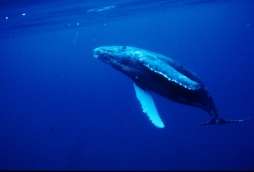Researcher: Culling whales will not boost tropical fisheries

(PhysOrg.com) -- For decades there has been a controversy about whales eating fish in the tropics. The “whales eat fish” debate has been at the heart of policy decisions about the culling of whales and is pivotal to the future of commercial whaling in the region. Today, however, chalk one up for the whales.
The controversy appears to be nothing more than a whale of a tale, according to research by ASU scientist Leah Gerber. In a paper supported by the Lenfest Ocean Program and Pew Charitable Trusts and published in the journal Science, Gerber and her co-authors show that the controversial practice, culling of whales to attempt to restore dwindling fish populations in tropical oceans, is not scientifically sound.
“Culling whales will not increase fisheries catches in tropical waters,” says Gerber, lead author and associate professor of ecology, evolution and environmental science in the School of Life Sciences in ASU’s College of Liberal Arts and Sciences.
For years, Japan has argued that reducing the number of baleen whales in the oceans would improve fisheries because whales eat fish that fishing industries could catch. The study published Feb. 12 found that even a complete eradication of whale populations in tropical waters would not lead to any significant increase in fish populations.
Many countries in western Africa and the Caribbean have been persuaded by Japan to both join the International Whaling Commission (IWC) and vote in favor of resuming commercial whaling under the understanding that culling whales would result in increased fisheries catches.
“Our models unequivocally show that whales do not significantly contribute to the decline of fish populations in tropical oceans,” says Gerber. “Instead, we find that fishing has far greater bearing on the health of the fish stocks in the region. Interestingly, when whales were more abundant before World War II, the fisheries were in good shape.”
“The assertion that whales are competing with fisheries for food is, on the surface, very persuasive, because it seems intuitive that these very large animals must be consuming enormous amounts of food,” explains co-author Kristin Kaschner, who is based at the Evolutionary Biology and Ecology Lab at the University of Freiburg, Germany. “However, competition within ecosystems is a complex issue and needs to be investigated using the appropriate scientific tools.”
The authors constructed ecosystem models, which account for feeding interactions between whales and fish, to understand the role that baleen whales play in tropical marine ecosystems in western Africa and the Caribbean, where baleen whales are known to breed. The scientists used global and regional data, validated through scientific workshops in Senegal and Barbados, to determine whether competition was occurring.
“An ocean ecosystem is greater than the sum of its parts. Removing whales from the equation does not increase the number of fish and impacts the health of the overall system,” notes Lyne Morissette, co-author and researcher with the Institut des Sciences de la Mer de Rimouski, Canada. “We need to focus on truly effective and sustainable management approaches to recover our fisheries.”
The researchers suggest these results underscore the important role that science should play in policy decisions about whales and fisheries interactions. They also emphasize that the goal of ecosystem-based management should not be to manipulate individual components of food webs in an attempt to maximize the productivity of fisheries, but to manage the whole system for long-term sustainability.
“All countries should adopt leadership roles in a common effort to manage our fisheries better,” says Daniel Pauly, a co-author from the University of British Columbia. “The assertion that fish supply is in peril is legitimate, but the problem is resolved with better management, not whaling.”
“It is important for countries that are dependent on marine fisheries to have the best information available based on sound science,” says Gerber. “Our hope is that our study provides guidance for future policy decisions.”
Provided by Arizona State University





















